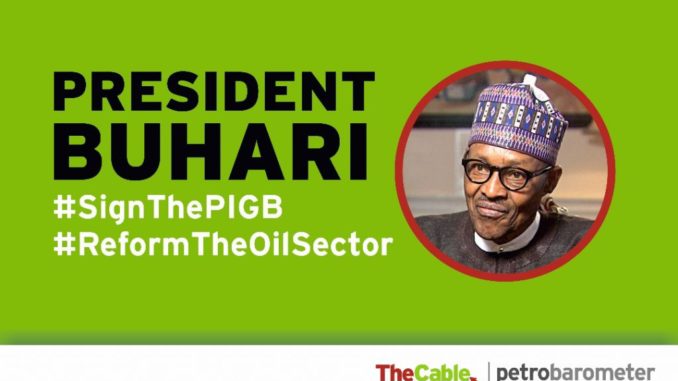
Over 100 days after the passage of the the Petroleum Industry Governance Bill (PIGB) by the national assembly, the bill has finally arrived at the desk of President Muhammadu Buhari for his assent.
TheCable Petrobarometer has confirmed that the bill arrived Aso Rock on Tuesday, July 3, 2018 — after a series of back and forth at the national assembly.
The passage of the PIGB, which is one-fourth of the omnibus Petroleum Industry Bill (PIB) which had stalled for years and suffered setbacks after its passage.
The harmonised bill was finally passed by both chambers of the national assembly on March 28, 2018.
Below are nine highlights of the provisions of the PIGB as passed by the national assembly.
NNPC OUT, NPC IN
The provisions of the regulatory bill state that NNPC will be restructured by splitting the assets and liabilities of the company. This essentially means that much of what comprises NNPC today, including the refineries, the Nigerian Petroleum Development Company (NPDC) Ltd and the joint venture (JV) assets, will be transferred to the proposed National Petroleum Company (NPC). The NPC will not be subject to the provisions of the Fiscal Responsibility Act 2007 and the Public Procurement Act 2007.
THE NEW ENTITIES
The bill proposes the establishment of the Nigerian Petroleum Regulatory Commission (NPRC), the Petroleum Equalization Fund (PEF) and the incorporation of three commercial entities including the Nigeria Petroleum Assets Management Company (NPAMC), National Petroleum Company (NPC) and the Nigeria Petroleum Liability Management Company (NPLMC). The NPRC which will be formed by merging the Department of Petroleum Resources (DPR) and the Petroleum Products Pricing Regulatory Agency (PPPRA). It will be the regulatory entity for the whole industry. The NPAMC will manage production sharing contracts and back-in rights provisions, while NPC will be in charge of current NNPC joint ventures with international oil companies (IOCs) upon incorporation.
FUNDING THE NEW ENTITIES
The bill states that the funding of the NPRC shall be from the appropriation act through the national assembly. A five percent levy on all fuel sold and distributed within the federation will finance the PEF, subject to appropriation by the national assembly. The NPAMC will be funded by the national assembly appropriation for the initial capitalization and subsequent financing of the company while NPC will also be funded by appropriation through the national assembly for the initial capitalization.
THE PETROLEUM EQUALISATION FUND (PEF)
PEF will ensure “economic balance of petroleum prices across all regions”. Uniformity is meant to be achieved through re-reimbursement of oil marketing companies for any loss that they incur solely and exclusively as a result of the transportation of petroleum products and for their provision of financing for infrastructural development throughout the federation. The PEF will determine the amount of reimbursement due to any oil marketing company for the purposes of equalizing products prices.
NO MORE REGULATORY OVERLAP
Full responsibility for environmental matters in the petroleum industry is now vested in the NPRC and not the federal ministry of environment. The NPRC is toensure strict implementation of environmental policies, laws, regulations and standards as it pertains to oil and gas operations. The regulatory body will also promote the healthy, safe and efficient conduct of all petroleum operations in an environmentally friendly and sustainable manner. However, the bill adds a clause that includes a voluntary collaboration of the commission with the Ministry of Environment.
MINISTER’S POWERS REDUCED
The minister of petroleum has been stripped of absolute power to incorporate other entities to assume and manage some of the liabilities of the NNPC. Under the petroleum act and the oil pipelines act, the regulatory functions of the minister of petroleum resources will be transferred to the NPRC, which will be governed by a nine-man board with a fixed tenure. The board’s composition includes one representative each from the ministries of petroleum resources, finance, and environment. The commission is vested with the power to make regulations, similar to the powers of the minister of petroleum resources under the petroleum act but the PIGB enables the minister to retain certain powers of discretion to “do all such other things as are incidental and necessary” for the performance of his ministerial functions.
EXPANDED REPRESENTATION
The number of executive directors of the NPAMC increased from three to four. Similarly, the NPRC will have a governing board made up of 11 commissioners. The number commissioners also increased from nine to 11 in order to ensure proper coverage of the industry regulatory functions while the number of non-executive commissioners increased from 1 to 2 in order to strengthen the board. The bill requires that the principles of federal character in making the appointments into the governing board. Appointment and removal of the commissioners are subject to senate approval.
INCREASED SHAREHOLDER PARTICIPATION
PIGB requires federal government to divest 10 percent of shareholding in the NPC in a transparent manner, within five years from the date of incorporation. An additional 30 percent is to be further divested within 10 years from the date of incorporation. This means that citizens can own a stake in the national oil company subject to any terms put forward for the privatisation exercise.
ALIGNMENT TO PUBLIC PROCUREMENT ACT
The NPRC is subject to the public procurement act and a corporate governance code will be defined for the Nigerian Stock Exchange for the NNPC successor companies. The, NPC however, will not be subject to the provisions of the Fiscal Responsibility Act 2007 and the Public Procurement Act 2007.
The ball is now in Buhari’s court…
END

Be the first to comment